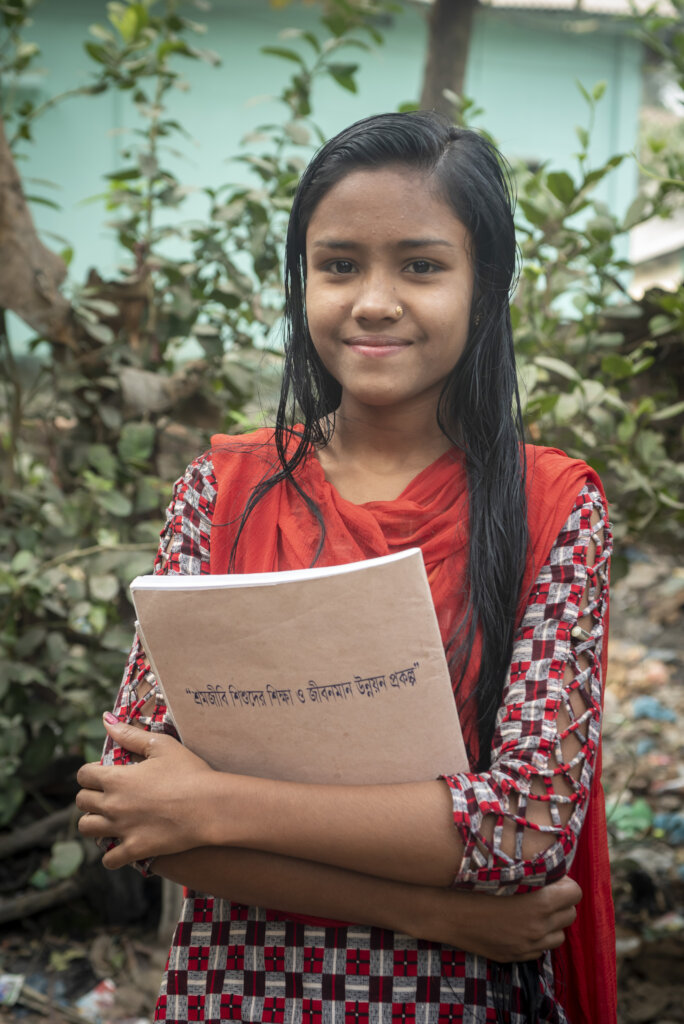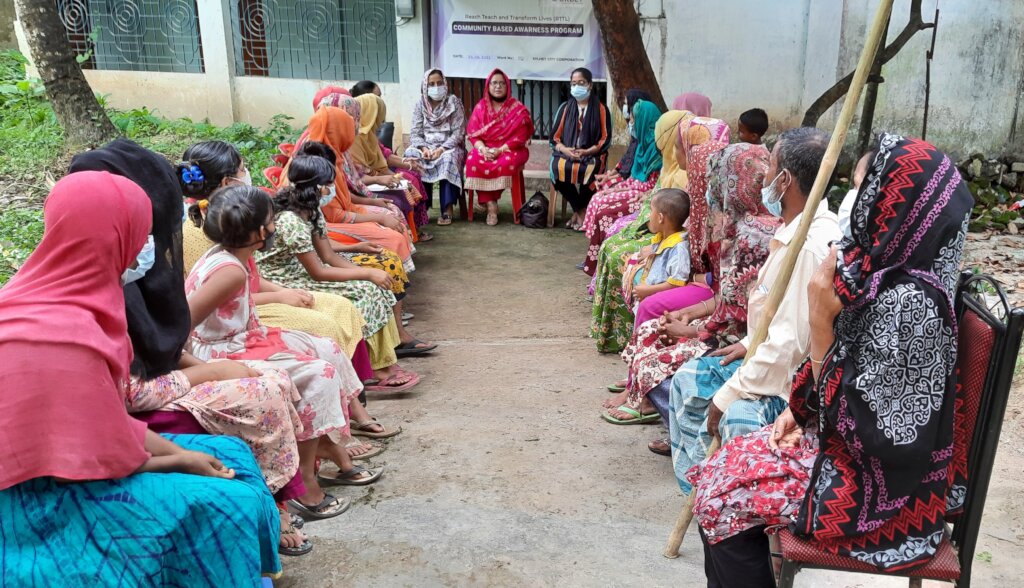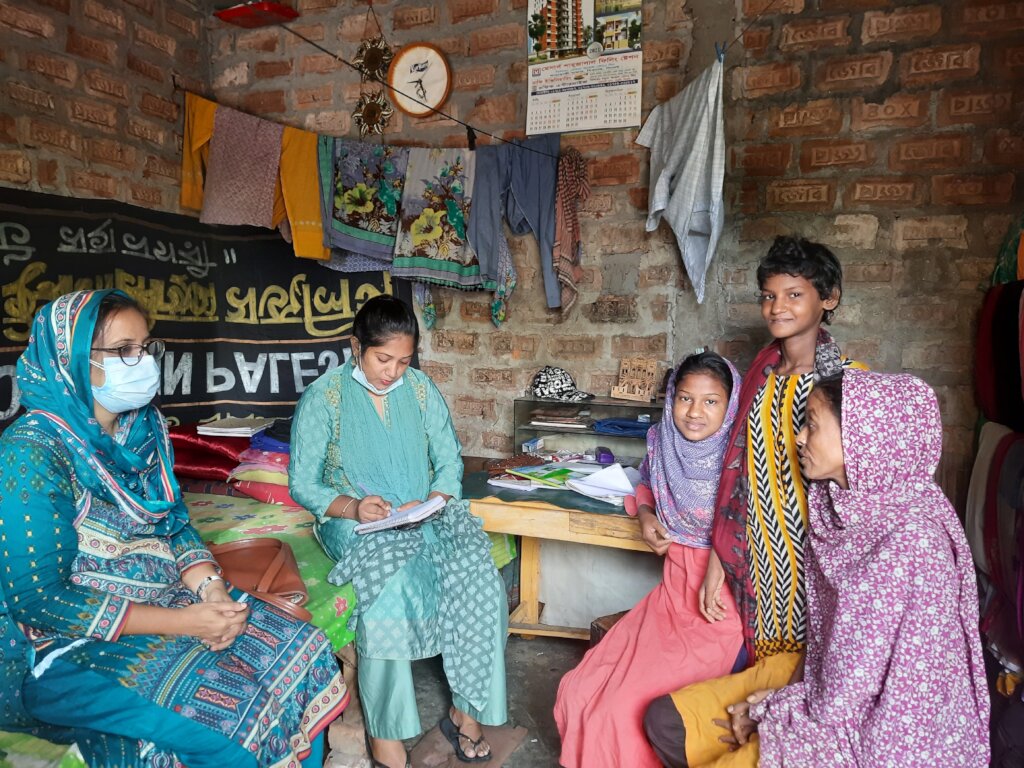By Mohammed Sayem | Project leader
Doorstep Learning brings basic education, healthcare, advice and guidance to children forced through family poverty to work as domestic servants instead of attending school. The programme supports parents and guardians in finding ways to increase family income with the ultimate aim of ending child labour.
Our Doorstep Learning model was developed from our pioneering work providing education centres and learning opportunities for boys doing hazardous work. We wanted to build on our learning about interventions with working children – and provide literacy, numeracy and life skills for working girls, too, so we adapted our model to use in domestic settings for children – girls and boys – doing domestic work. We realised children doing domestic work may not be allowed to travel to a local centre, so we designed this programme to take learning directly to the domestic settings where children work. Our specially trained community teachers support individual children or small groups who work near to each other, with the employers’ permission, in their homes.
At present we are working with 176 children engaged in domestic work at 14 different locations of Sylhet. 90% of those children are girls. 16 community teachers supervised by 1 full time field coordinator and 1 part-time curriculum coordinator are directly working with these children. They are lead by the Project leader.
The impact of our work :
Child labourers develop literacy, numeracy and life skills
As planned, 176 working children are engaged (90%). Additional children are recruited as places became available.
Covid safety measures were put in place. As child domestic workers mostly have 1:1 sessions in employers' homes, these continued throughout most of lockdown. The boys attend large group sessions at learning centres near to their work places. These temporarily stopped and resumed in September 2021 when lockdown measures were lifted.
All engaged children have benefitted from basic literacy, numeracy and life skills sessions (6 hours/week) with progress measured by formative and summative assessment against baseline assessments. 86% children have made expected progress. Extra support was given to some children, where needed.
Individual tutorials support children’s progression out of child labour into school or training. To date:
- 67 working children enrolled in school and, in line with national policy, will join in January 2022.
- 5 children completed vocational training. 4 others will be progressing to vocational training early 2022.
- 11 children left their work places, returning to their homes.
2. Increases in confidence, self-worth and wellbeing
All children developed awareness and agency on their rights, civic responsibilities, health, wellbeing and life choices and were signposted to services and support they can access.
Increases in confidence, self-worth and wellbeing are supported by child-centred approaches, underpinned by the training and support for the community teacher team. This included a 15-day intensive teacher training course and a workshop programme including: Behaviour management; Managing and supporting learning; Pastoral support and signposting; Active Learning; Child-centred teaching methodology.
3. Improved health and circumstances for families/no siblings enter the workplace
The impact of the project extends to the working children’s families who are regularly visited and/or contacted. Families suffered extreme financial hardship during the pandemic lockdowns. A micro-grant was given to the disabled father of one working child to enable him to keep his small business going. UKBET raised additional funds to provide each family with basic food packs, plus clothes and food for Eid.
Additionally, 38 families were supported in the following ways:
- 21 families received interest-free small loans to start or expand a small business.
- 34 siblings enrolled at schools ( to start January 2022).
- 5 family members enrolled in vocational training.
- 9 family member received medical treatment.
- With support from the Rotary Club, 110 people accessed basic medical services and medication.
- Birth certificate applications for 17 siblings.
- 9 family members, identified as having a disability, accessed the Government disability allowance, a benefit they were unaware of.
4. Greater awareness of children's rights / decrease in child worker numbers
16 community awareness-raising programmes were held in four wards, averaging 30 participants at each, including Ward councillors, local community leaders, working children’s parents and neighbours. Subsequently, 27 families withdrew their children from work and sent them back to school. No siblings of engaged working children became child workers.
This project has enabled us to deepen our understanding of key issues affecting working children and their families and to further develop strategies to address these.
1. Illegal employment of children: Despite it being illegal to employ children under the age of 14, it is clear the practise is still very widespread. Highlighting the issue, and challenging the practice, across all sectors of society, continues to be a priority.
2. The rights of children to an education: Education in Bangladesh is compulsory for five years of primary education plus the first three years of secondary education. Nevertheless, family poverty is a key reason why children become full time workers instead of attending school. While ensuring working children on our projects can develop basic literacy and numeracy skills, we will continue to support their transition back to school or progression onto training in order to ensure they can access their right to an education and improve their life chances.
3. Child marriage: Even though the Government has declared Sylhet Sub-district as a child-marriage-free area, the practice is still rampant, especially impacting on the most disadvantaged girls. We were made aware of three child marriages which we tried to stop, and were successful in two cases. We ran a huge awareness-raising campaign against child marriage through direct counselling with parents and children and as part of our wider awareness-raising programme with local people, including films and drama. We have widely publicised the Government’s toll free child marriage Hotline (109) which most potential victims had been unaware of.
4. Drug abuse: Working children can be particularly vulnerable to drug abuse and addiction. We cover the dangers of drugs as part of the children’s life skills programme, and wider awareness-raising.
5. Violence towards children: Some working children are regularly physically assaulted by parents and/or employers. We will continue to address this issue as part of our awareness-raising programmes for families, communities and employers.
6. Malnutrition: Most working children suffer from malnutrition. We have signed an MOU with Euglena GG Ltd who supply special biscuits which we give to children attending our programmes. These biscuits contain 59 varieties of nutrients and provide 100% daily requirement of Vitamin A, Iron, Iodine and Zinc - the most required nutrients for Bangladeshi children. As a result, we have observed visible improvements in children’s health.
To further build on this learning, in future projects we will:
- continue to address key issues as a high priority directly with working children, their families, employers, local communities, as well as wider stakeholders
- further build our networks with service providers to widen the impact and benefits of signposting working children and their families to benefits, support and advice
- strengthen connections with schools and training providers to support successful progression out of child labour into formal education or training.
Story of Pushpa (age 9 years) (Not her real name)
Her first Doorstep Learning session was also Pushpa’s first experience of education as she has never been to school. Pushpa always wanted to go to school like other children of her age but her father, a rickshaw puller, simply could not afford to let her go. She was sent to work rather than school when she was only 8 years old. One day UKBET’s community teacher, Yasmin Akther, visited Pushpa’s domestic employer and asked if she could meet Pushpa regularly in the employer’s house to teach her reading and writing. Now Pushpa recognises Bangla letters and a few words. She says she wants to be teacher like her own teacher, Yasmin, who has provided her first experience of learning. A micro-grant was provided to her father to start a mobile tea stall and enable the family to stop being financially dependent on their children’s labour. Pushpa and her sisters will start school in January 2022.
By Mohammed Sayem | Project Leader
By Mohammed Sayem | Project leader
Project reports on GlobalGiving are posted directly to globalgiving.org by Project Leaders as they are completed, generally every 3-4 months. To protect the integrity of these documents, GlobalGiving does not alter them; therefore you may find some language or formatting issues.
If you donate to this project or have donated to this project, you can recieve an email when this project posts a report. You can also subscribe for reports without donating.
Support this important cause by creating a personalized fundraising page.
Start a Fundraiser

